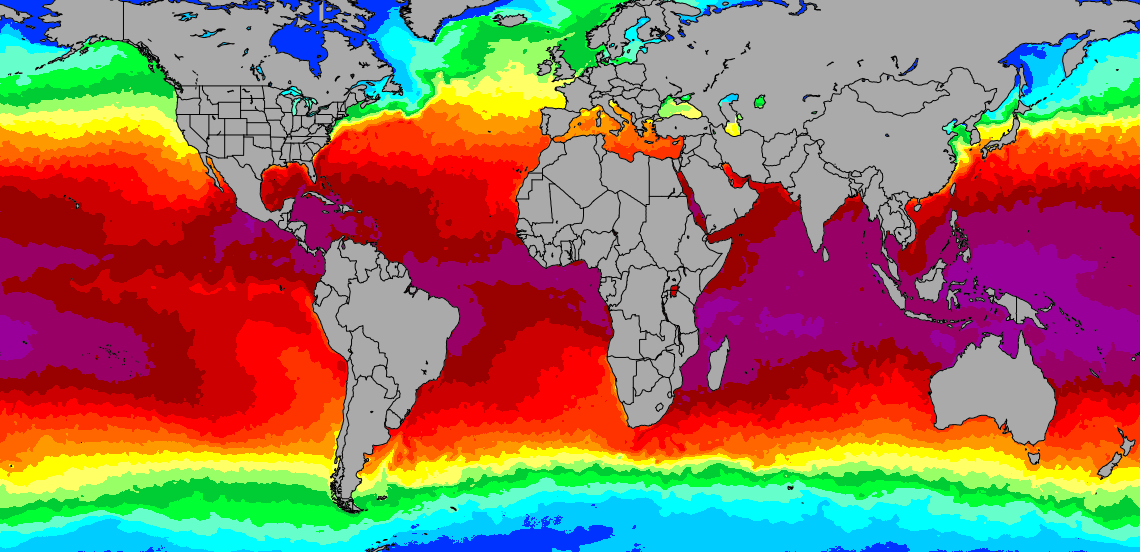By Oisin Hill
“The ocean is hotter than ever, what happens next?,” begins a news article published in May of this year by Nature, the world’s leading scientific journal. 2023 has seen the ocean’s surface temperature rise to its highest since records began, leading to marine heatwaves across the globe and exceeding the predictions of many climate models. Here in Ireland, the ocean surface temperature was recorded as being 4-6°C above average for June with even higher temperatures on the horizon for later this Summer.
Devastating impact
In recent decades, the planet’s oceans have absorbed 90% of the heat from greenhouse gases. The significant shift in global ocean temperatures, exacerbated by the El Niño climate event in the equatorial pacific ocean, has disastrous consequences for people and ecosystems. Ocean warming accelerates sea level rise – water expands at higher temperatures, and hotter polar oceans speed up the rate of melting sea ice, adding yet more water into the world’s oceans and threatening the homes and lives of millions across the planet.
Extreme weather events are becoming more frequent and intense due to ocean warming and climate change. This year has seen record heat waves in the southwestern United States and southern Europe. People in Italy are being hit, particularly with a road worker in Milan dying of heatstroke and many more outdoor workers unable to work or having underlying health problems exacerbated by the heat. Heatwaves like this, along with other extreme weather events, threaten to kill and displace more and more people worldwide and will continue to do so as long as we live in a system that prioritises profit over human life and planetary health.
Despite this, the world’s largest fossil fuel firms continue to push ahead with 195 “carbon bomb” oil and gas projects that would each result in at least a billion tonnes of CO2 emissions over their lifetimes. Our planet is not dying, it is being killed.
Marine tipping point
Scientists have warned that rising ocean temperatures devastate the ocean’s biodiversity, causing mass die-offs of many marine species and further destroying habitats already ravaged by decades of profit-driven overexploitation and pollution. As on land, where wildfires ravage vitally important rainforests, heatwaves in the ocean have the potential to destroy vast swathes of seagrass beds and kelp forests in the seas surrounding Britain and Ireland, ecosystems that draw down vast amounts of carbon and provide habitats for thousands of species. If a tipping point is reached, these ecosystems could emit carbon rather than absorb it, creating a disastrous feedback loop.
The implications for fisheries are also dire. Around 16,000 people in the Republic of Ireland and around 5,000 in the North rely on fisheries for employment, many in remote or impoverished coastal communities where other options are limited. Globally, it is estimated that three billion people depend on the ocean for food, most of them in countries in the Global South, reliant on small-scale fisheries threatened by climate change and overfishing. Marine biodiversity loss is thus a massive threat to food security and job security. As always, the poorest in society must bear the brunt of the destruction. In the warming of the ocean, we see how capitalism severs the intricate connections between living organisms. These connections produce the air we breathe and the food we eat, and that keep the earth’s climate stable.
If we want to fight to preserve the living sea and all it provides for us and alleviate the worst effects of climate change and ecological devastation, we must fight for a different kind of society. It means a democratic socialist society, where production is organised sustainably, as opposed to the thoroughly destructive pursuit that capitalism is built on.
Democratic planning and the collective public ownership of our planet’s resources can meet the needs of all people and for the health of the planet, rather than to line the pockets of fossil fuel magnates and big business generally.












